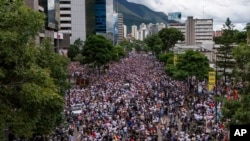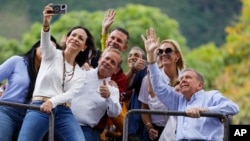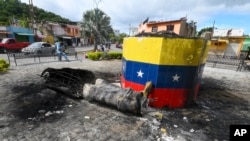U.S. President Joe Biden and Brazilian President Luiz Inácio Lula da Silva on Tuesday called on Venezuela's government to release detailed voting data from the presidential election.
Electoral authorities have said President Nicolás Maduro won, but the opposition says their candidate, Edmundo González, secured more than twice as many votes in Sunday's election.
In a joint statement after a call in which Venezuela's election was discussed, Biden and Maduro ally Lula said they "agreed on the need for immediate release of full, transparent, and detailed voting data at the polling station level by the Venezuelan electoral authorities.
Both presidents said the outcome "represents a critical moment for democracy in the hemisphere."
Criticism of Maduro has mounted since electoral authorities declared him the winner Monday.
Thousands of ardent opposition supporters gathered outside the United Nations' offices in the capital, Caracas, to mark what they say was an electoral victory by opposition candidate Edmundo González. Maduro's allies, meanwhile, appeared on television to accuse opposition leaders of being fascists.
Opposition leader Maria Corina Machado, standing atop a truck in Caracas, called on the National Electoral Council, which is loyal to the ruling United Socialist Party of Venezuela, to release the voting tally sheets produced by every precinct after polls closed, asking, "Why don't they publish them?"
Machado said the opposition coalition behind González's candidacy has obtained more than 84% of the tallies and that she is confident he was chosen in Sunday's election to be Venezuela's president.
"The only thing we are willing to negotiate is the peaceful transition," Machado said as the crowd chanted, "We have no fear!"
Machado and González urged their supporters, thousands of whom protested across the country Monday, to remain calm and avoid violence.
"And remember this figure, when the tally sheets are counted, yours truly will have more than 8 million votes," González said, flanked by his wife and Machado, who has been barred from running for political office for 15 years. "We are going to begin the reconstruction of Venezuela."
Their celebration came hours after the Organization of American States lambasted the National Electoral Council for not releasing the precinct-level results.
"The worst form of repression, the most vile, is to prevent the people from finding solutions through elections," the organization said in a statement. "The obligation of each institution in Venezuela should be to ensure freedom, justice, and transparency in the electoral process."
The organization, which has called an urgent meeting of its members to discuss Venezuela's election, even suggested that a new vote could take place to resolve the widely different results that electoral authorities and the opposition have presented. The do-over, the organization said, would require robust international observation.
In Washington, the National Security Council said the United States continues to monitor Venezuela following the election, and urged authorities to release "full, transparent, and detailed voting results."
"There are clear signs that the election results announced by Venezuela's National Electoral Council do not reflect the will of the Venezuelan people," NSC spokesperson Adrienne Watson said in a statement.
Maduro's closest allies came to his defense Tuesday. National Assembly President Jorge Rodriguez, who is also Maduro's chief negotiator in dialogues with the U.S. government and the opposition coalition, insisted Maduro was the indisputable winner and described the opposition as violent fascists.
"Never! They will never come to power!" Rodriguez said before clapping lawmakers.
Diosdado Cabello, a lawmaker and ruling party leader, later said, "We are going to screw them, because these people do not deserve to shed one more drop of blood for fascism."
Venezuela has the world's largest proven crude reserves, and once boasted Latin America's most advanced economy. But it entered into free fall after Maduro took the helm in 2013. Plummeting oil prices, widespread shortages and hyperinflation that soared past 130,000% led to social unrest and mass emigration.
More than 7.7 million Venezuelans have left the country since 2014, the largest exodus in Latin America's recent history.
Thousands of Venezuelans took to the streets nationwide Monday to protest. The protests in Caracas were mostly peaceful, but when dozens of riot police blocked the demonstrators, a brawl broke out. Police used tear gas, and some protesters threw stones and other objects at the officers. A man fired a gun as the protesters moved through the city's financial district, but no one was injured.
Attorney General Tarek William Saab said Tuesday that more than 700 protesters were detained, one officer died, and 48 military and police officers were injured. Some of those arrested will be charged with terrorism, he said.
Among those arrested was opposition leader Freddy Superlano, who was filmed by a bystander on Tuesday as armed individuals forced him and two other men into an SUV. Superlano and one of the men threw what appeared to be their cellphones, which were then picked up by the people detaining them.
U.N. Human Rights Chief Volker Türk expressed alarm over the post-election climate in Venezuela.
"Hundreds of people have been arrested, including children. This troubles me deeply," he said in a statement. "I am alarmed by reports of disproportionate use of force by law enforcement officials along with violence by armed individuals supporting the Government."
Long lines started to build Tuesday outside supermarkets and other stores in Caracas that sell food and essential supplies, in apparent anticipation of a prolonged period of demonstrations that could lead to food shortages.
The election was among the most peaceful in recent memory, reflecting hopes that Venezuela could avoid bloodshed and end 25 years of single-party rule. The winner would take control of an economy recovering from collapse and a population desperate for change.
In the port city of La Guaira, people toppled a statue of Maduro's mentor and predecessor, Hugo Chávez, dragged it to the street and set it on fire during Monday's protests. Maduro unveiled the statue in 2017, and by Tuesday, all that remained was its base, littered with twisted rebar and broken cement.
"I hold you, Mr. González Urrutia, responsible for everything that is happening in Venezuela, for the criminal violence, the criminals, the wounded, the dead, the destruction," Maduro said Tuesday during a televised meeting of the National Defense Council. "You will be directly responsible, Mr. González Urrutia, and you, Mrs. Machado, and justice has to come. In Venezuela, there has to be justice, because these things cannot happen again."
Machado told reporters that tally sheets from polling stations show Maduro received more than 2.7 million votes while González secured roughly 6.2 million. Meanwhile, the electoral council reported Maduro and González garnered about 5.1 million and more than 4.4 million votes respectively.
More than 9 million people cast ballots Sunday, according to figures released by National Electoral Council President Elvis Amoroso.
The number of eligible voters for this election was estimated to be around 17 million. Another 4 million Venezuelans are registered to vote, but they live abroad and many did not meet the requirements to register to cast ballots overseas.
As Machado and González stood atop the truck, supporters began chanting "President! President!"
"This gathering smells like triumph," González told them.






